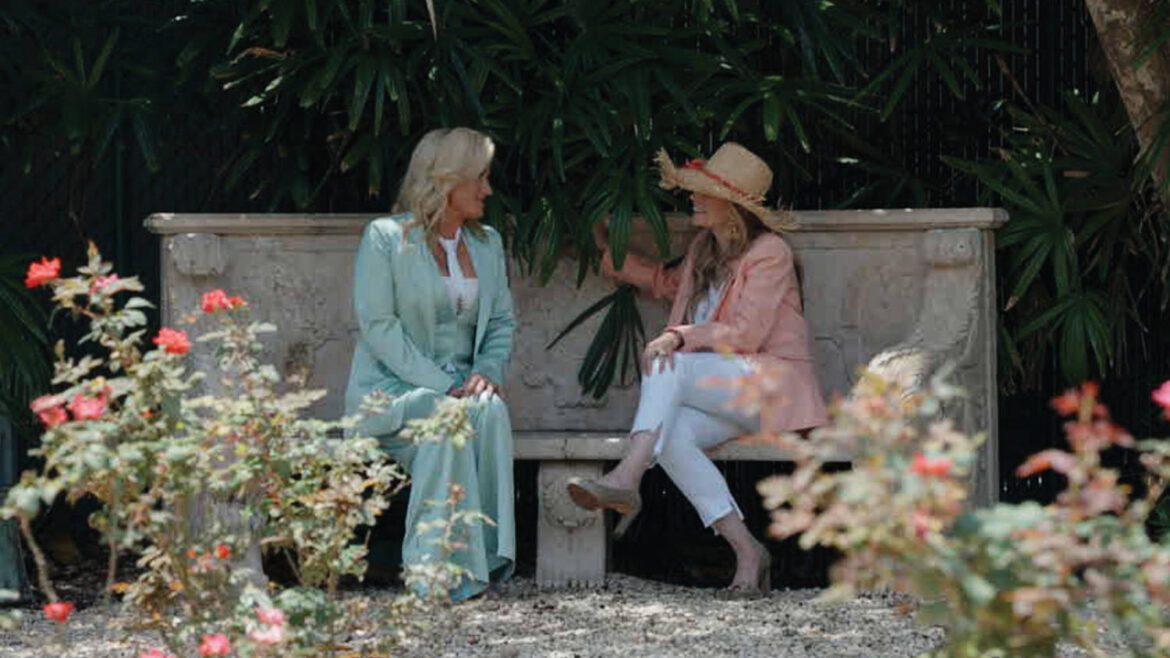JESSICA WORD’S journey at Word & Brown General Agency began at a young age, working in the mailroom of her family’s company. Cofounded in 1985 by her father, John M. Word III, and Edward J. “Rusty” Brown, Jr., the Word & Brown Companies have since grown to include the Word & Brown General Agency, one of the largest independent health insurance general agencies in the U.S. Additionally, they are the parent company of CHOICE Administrators, which oversees CaliforniaChoice and ChoiceBuilder, the largest private multi-carrier, small group health insurance and ancillary exchange platforms in the nation.
Now 47, Jessica, a California native and married mother of two, serves as the Chief Executive Officer of the Word & Brown General Agency.
In this interview, Jessica shares that it wasn’t until she was 40 that she realized she had been telling herself everything was great when, in fact, she was struggling. Having two children just 15 months apart without taking maternity leave took a toll on her, both physically and emotionally. At that moment, she decided to let go of her limiting beliefs, focus on self-healing through self-love and self-care, and fall in love with herself for the first time.
In 2021, you were made CEO of Word & Brown. How many years had you been working there?
I started working at Word & Brown when I was eight years old. My father, John Word, and Rusty Brown were the founders of the company. At eight years old, I was cleaning out file cabinets with a sponge and paper towels. I have essentially worked here “off and on” my entire life. I started in the mail room and have worked in every department, in every division, from the ground up. I am 47 years old now, so when you think I was eight years old when I started working there, you realize it has been a very long time.
Thirty nine years at Word & Brown, the largest privately held General Agency in California, is quite an accomplishment. When you see a young woman coming up through the Word & Brown ranks, do you have flashbacks of yourself at that age?
Yes, I do. I see myself in a lot of young women coming up through the ranks, and sometimes, I just want to hug them and tell them to keep going: you got this.
Word & Brown is a “general insurance” agency. What does that mean?
A General Agency in the health insurance space is really an intermediary that works with insurance carriers and individual insurance agents or brokers. Our company provides services to brokers in California and Nevada, and we represent all of the medical carriers in those states; we also offer dental, vision, and life insurance. The value of a General Agency to an agent or broker is we consolidate all available insurance options in an easy-to-understand quote for brokers to share with their small business clients. This concept is like comparing flights through Priceline or Expedia. Additionally, a General Agency provides brokers with support throughout the sales, enrollment, and open enrollment process; we provide education and training, and we also offer a number of other tools designed to make the broker as efficient as possible.
Were you a girly girl or a tomboy at the age of eight?
Tomboy.
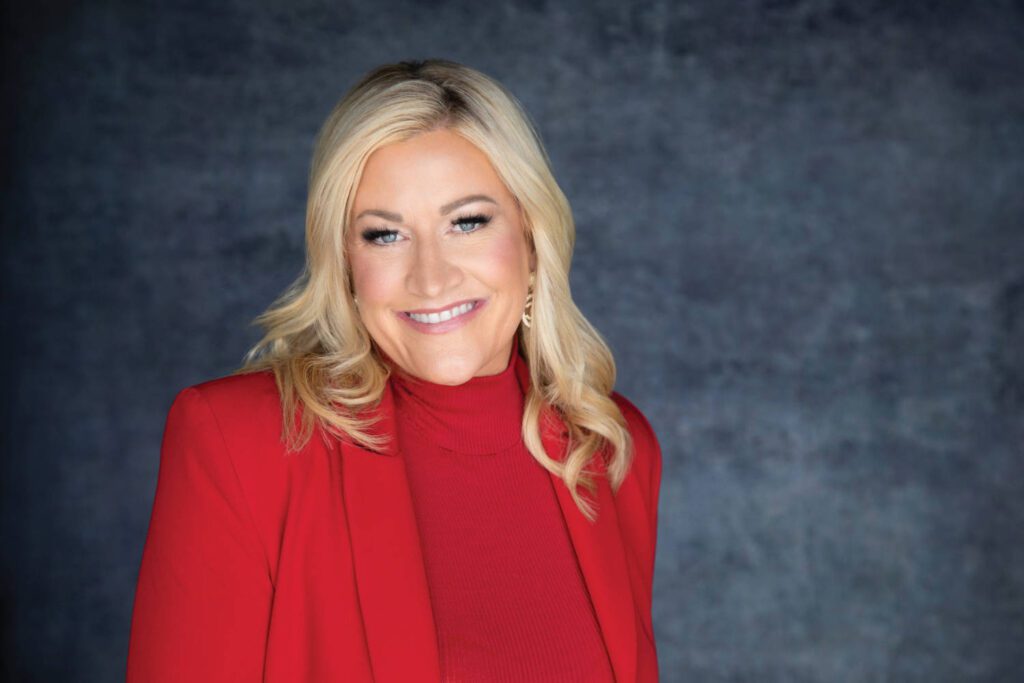
Lesley Bohm Photography
And what was your first paying job?
My first paying job was at Irvine Park. I was 12 years old and fortunate to find a place that paid me to ride horses while taking people on trail rides.
Are you an introvert or an extrovert? I ask this because many CEOs are required to work as extroverts.
I am a little bit of both, so I never looked at the CEO position as requiring one or the other. I love that question because being the CEO is not something that defines who I am. I have always been the person that just wants to help. I love puzzles. I love operations, “finding the cheese” so to speak. I understand how the company can be more efficient and speak up. I always offer my advice and try to help others. It authentically comes that way for me.
Critical thinker, problem solver, or logistics, which word best defines you?
All of them.
Project management or visionary?
Both of them.
You had to become all these descriptors because . . . fill in the blank.
I had to become all of them because I worked in all divisions, and I had to understand the business from the ground up. Complete operational understanding is critical to be able to offer advice and suggestions. If you don’t understand how something works you will not get the respect of your teammates nor understand the company’s vision. Without a strong team that has mutual respect for their peers and leader and a comprehensive understanding of the vision, you cannot think strategically to streamline systems for increased productivity.
Your ability to multitask and wear multiple hats, are those characteristics hardwired into you?
I was not given a choice. I have always been that person that wanted to try to help. At one time, I was a big-time people pleaser, but I have learned later in life, to begin pleasing myself too, which is a significant part of
my journey.
Where were you born and are you the youngest child?
I was born in Fountain Valley, California. Yes, I am the baby. My brother is two and a half years older, and my sister is seven years older.
There are many challenges with being the youngest in a complex family situation. You are the child of divorced parents. Did you spend most of your time with your mother, or with your father?
I lived with both of them in Santa Ana, CA, until they divorced when I was 12 years old. After that, I lived mostly with my mother and saw my father every other weekend. He moved to Newport Beach and my mom moved us to Tustin, CA. I have cherished memories of spending time with both my mother and father. While I primarily lived with my mother, my father and I bonded during family vacations. He also made it a point to attend most of my junior high and high school sporting events.
Do you think what you experienced as a young woman impacted your choices as an adult?
I believe that my experiences have given me examples of what I want to do, what I want to experience, and things that I don’t want to do. I am grateful for all of it because it molded me. And so yes, what I experienced had a major impact on what I want to create, the environment for my family life, and what I want for my children.
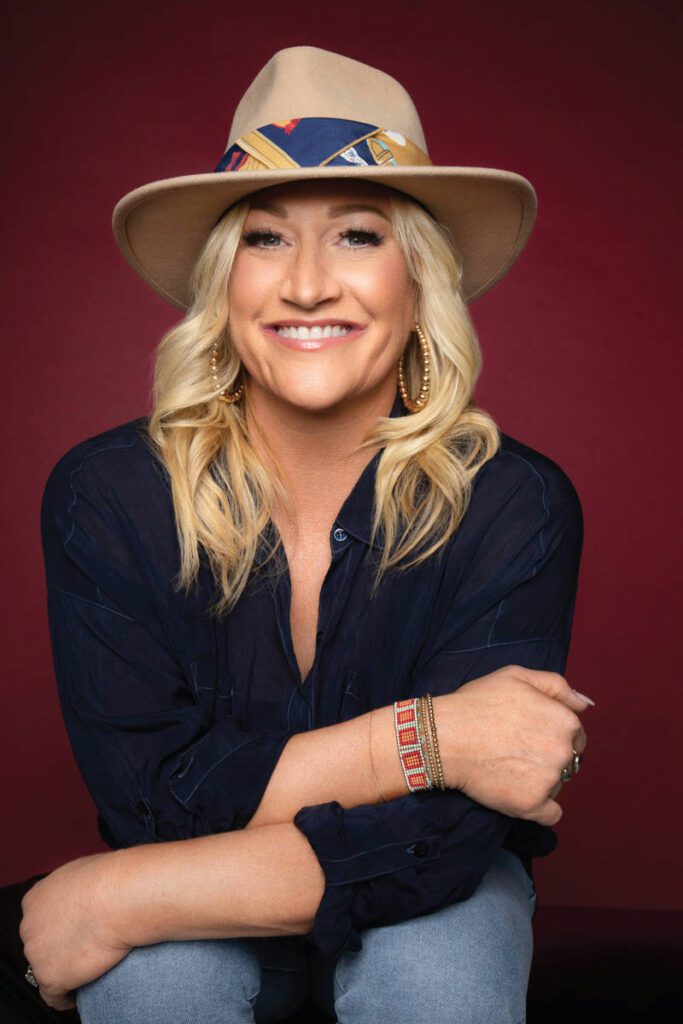
Lesley Bohm Photography
What things do you feel passionate about? We all have life experiences that mold us, but we also have choices to move forward. What are those for you?
First of all, I am madly in love with my husband. He is amazing. His parents are still married, which I love, especially in California, where the divorce rate is significantly higher. Not to focus on that, but I am passionate about loyalty and integrity. I want to do right by my kids. One of the most important lessons for them is to love yourself and be who you authentically are. I support them unconditionally and try to teach them by example, that you will not always get it right, and that’s okay, you’re human. Even now I still seek clarity… because I do not always know what to do, I just know what I don’t want to do. The list of things I am willing to put up with continues to get smaller and shorter with time.
Is that self-actualization?
Being self-aware. You nailed it.
To have self-awareness, you have to go through good and bad. Which was it for you?
I would put the good and the bad together because it was my life’s experience, so I am unable to put them in different buckets. I had good experiences and bad experiences, but I truly can’t look back and say what was good or bad, because all my experiences got me to where I am today. I went through some pain, and it wasn’t easy. But here I am today, and I love where I landed. I learned a lot along the way.
Did your difficulties teach you compassion?
Oh, yes, both compassion and empathy. It took a lot for me to figure this out. Being a people pleaser is a characteristic a lot of women share, and I consistently neglected “me” along the way. The good and the bad experiences taught me to change this.
What is critical to your well-being?
Both self-care and self-love.
I think women are terrible in acknowledging this . . . do you agree?
We absolutely are, and they are critical. It takes time to understand the importance of self-care and self-love. As we go through experiences in life, how we respond is a product of how we are emotionally, mentally, and physically, and that knowledge is important. This is something I’ve learned with age. My parents’ divorce wasn’t easy. Divorce can be ugly and sad, particularly if you’re a child who wants to make people happy, and all at once, you are not a priority. Dividing time was hard for all of us.
Those who experience childhood trauma have a choice to end up becoming resentful, bitter, and angry (dark) or they forgive and embrace their journey (light). How were you able to move through this?
For a long time, I was judging myself by how others judged me and I reached a point where it was dark.
At some point, I attended an amazing leadership series where I learned that I did not really like myself. It was transformational because when you go to the office or are with family and friends, you show up a certain way. You
know if you are not having a good day, but no one can tell, because you are smiling.
What is interesting is when I entered a safe environment of strangers, they told me exactly how they perceived me. They saw straight through my smile and knew I wasn’t showing up as myself.
During these leadership classes, they had exercises for the whole group, and it was the first time I had ever sat in the back of the room, simply listening. I didn’t want to be responsible for anything, so I just sat in the back and watched people.
I realized my passion was to help others and that I loved what I did. It was the first time I felt I loved something, yet I also recognized that I did not love myself and was holding myself hostage.
How old were you when you realized that?
It was only five years ago, in 2017, and I am now 47.
Of the hundreds of interviews I have conducted, would it surprise you to know that around the age of 40 most women have these types of life realizations?
Not really; I think it takes time to decide that you will not put up with unhappiness. I think we get to the point where we become fed up and can’t fake it anymore.
Is it a control thing?
Well, I believe control is an illusion. All one can really do is regain control of oneself. If you can breathe, you can choose.
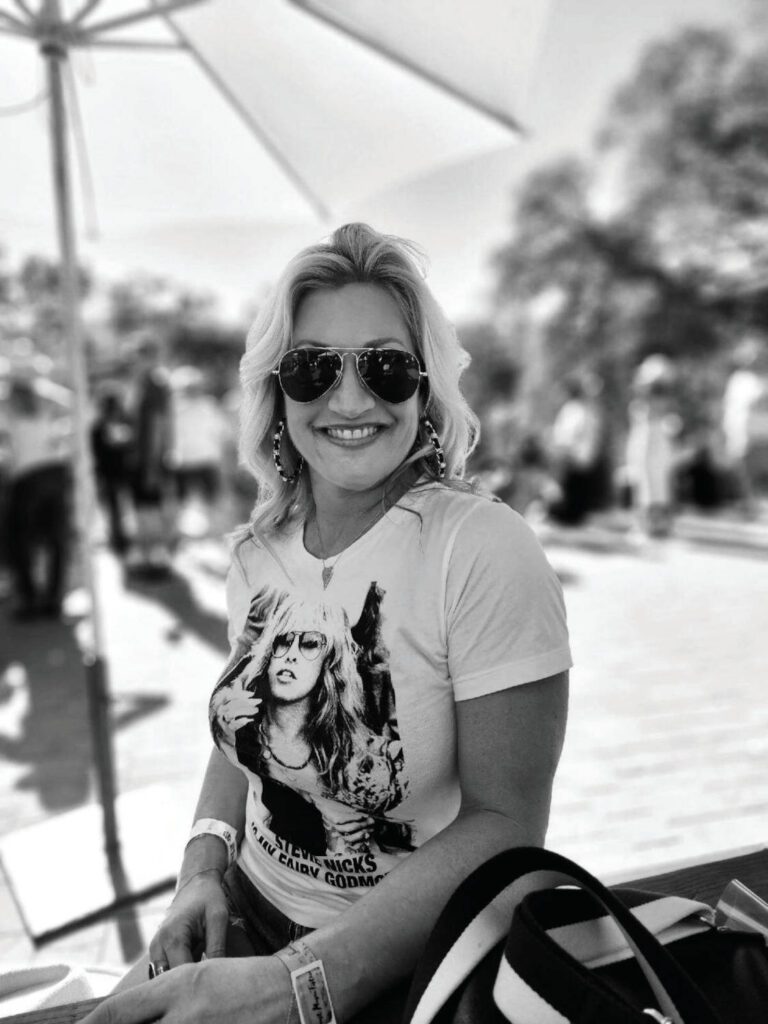
Two milestone years . . . 2017, and 2021 when you were made CEO.
In 2017, I had a profound change, and I learned to forgive myself. I was still holding on to several past experiences/traumas where I was disrespected and minimized, and it affected me. I was still upset for being that weak person who allowed myself to be in those situations, and I felt I should have known better and stuck up for myself.
I recognized that I was just human and once I forgave myself, I fell in love with myself for the first time. It was the most beautiful feeling because it changed my entire life.
I love people, but if someone is nasty or rude to you, I learned it has nothing to do with me. I live my life differently now. I go to bed every night, put my head on my pillow, and know that all my actions from that day were made with integrity, meaning I tried to do “right.” Right by God. Right by spirit. This is how I choose to live my life.
Was your husband with you through your journey or was that a very lonely period?
He was definitely with me. But there are some things that you just cannot share or even explain. You must experience it. I love men, but if you talk to a man, they just want to fix it. And sometimes women just want to talk through it. Men don’t get that. It can be frustrating too because as females, I think just talking out loud makes us feel better. It gets it out of our system.
You, much like many women, had signs of postpartum depression after the birth of your children.
It was a very painful part of my life because I was misdiagnosed twice. My family knew I wasn’t okay. I had babies back-to-back 15 months apart and I worked the entire time. My kids are now eight and nine.
I became president in 2013 when Obamacare was created. I was seven and a half months pregnant at the time. I think I wanted to prove that women don’t need or have to take personal time to have a baby . . . “you just play like the big boys.” I also wanted to show the naysayers that I could do it all.
I regret that now, having worked through both pregnancies, but at the time, it just wasn’t an option. Meetings were scheduled three weeks after having my baby, so I just went for it, and I really never stopped working.
You literally had a baby and went back to work. And no concessions or empathy from anyone?
All the females at the company understood but not at the executive level. Mind you, people were sweet and happy for us, but that lasted about 3% of the conversation which was fine because I wasn’t there to talk about my baby. I wanted to talk about work.
But the toll on you with childbirth, new motherhood, and taking on a new job . . . What was that like?
It was like drinking through a fire hose. Shortly after my first, I became pregnant and had my second child 15 months later, and my body mentally and physically began to break down. Something was not okay with me, and I was not normal.
It wasn’t until a few months after my second child that I learned a woman’s body needs about a year in between to recover.
To be transparent, after my second child, I was sick with sepsis and had to be hospitalized on two separate occasions. I literally felt like a zombie; I was living in a fog bank. I didn’t know I was gravely ill; I could no longer ascertain what feeling healthy vs not feeling healthy was anymore. I didn’t know what was going on with me.
Professionally to put everything into context, being made president of Word & Brown was a huge undertaking in and of itself because your company is the largest privately held General Agency in California.
Yes, it was a big undertaking, but also a privilege.
What was that like?
I love what we do, and today, everything is changing with the global shift of more women coming into the workforce and serving in executive positions.
The world has changed in the past decade, hasn’t it?
Today, there is also an emotional shift in which women support each other. And let me tell you, it wasn’t always like that. Early on, I shied away from women’s events because I was the only female at the executive level at my company.
At your level as CEO, you still statistically are the only woman in the boardroom.
Absolutely, and it still is not easy.
It is not easy because . . . fill in the blank.
It’s not easy and I love my father who paved the way. He has done so much for me as my mentor and my best friend. But he is also old school and very traditional. Sometimes it feels like, employees or businesses want to hear from a man.
Many women interviewed describe a scenario, where if they offer an opinion or position in mixed company, there are blind stares. Abundant affirmation and credit are given if a man offers the same option or position. Is this your experience too? If the idea comes from a male, suddenly, it is the right answer.
That is exactly what happens. I say something and then somebody repeats it, and suddenly, it is okay.
It is validated.
For years I dimmed my light for others. When you have answers as a woman executive, people become envious. Over the years, I have learned that when people do not have integrity or do something to you, it has nothing to do with you, which is why you need to have empathy. I feel bad for mean people because nobody wakes up angry…and sad manifests into anger.
If somebody is in such a bad place that they take it out on others, it is often because it numbs their own pain. I have empathy, but for a long time, I did not understand the root cause of their ugliness.
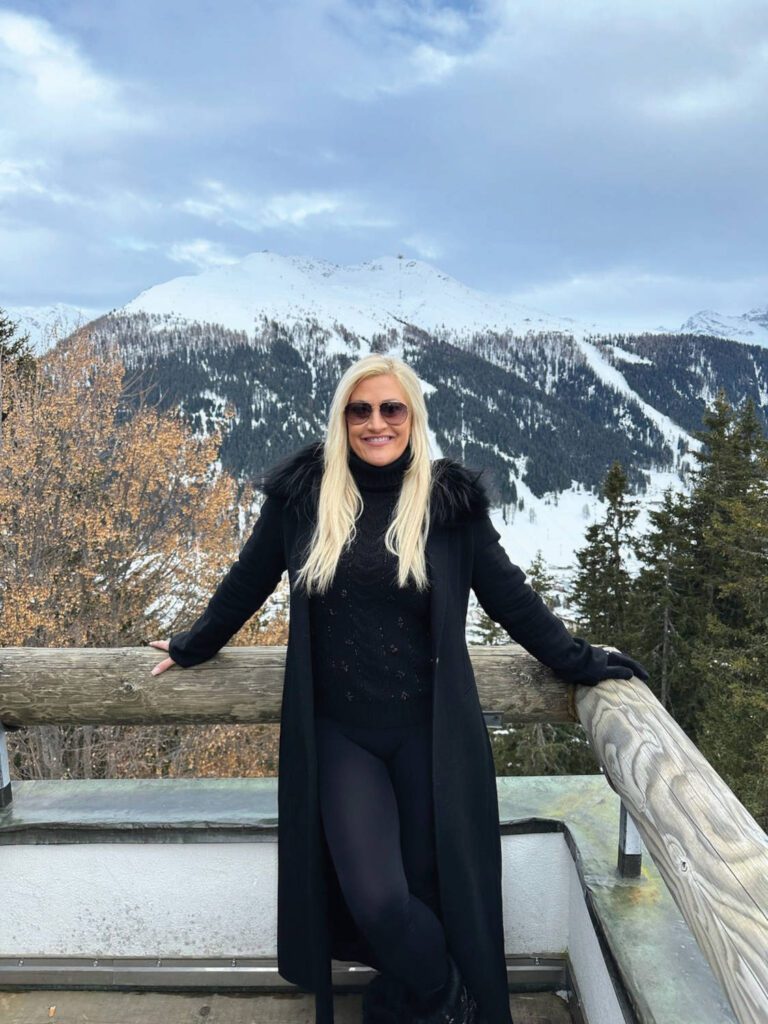
ELYSIAN “Inspiring Woman,” Jessica Word, during a recent trip to Iceland.
Take me through “A Day in the Life” of Jessica Word. You get up at what time?
It ranges, but normally 4:30 AM, depending on how late I go to bed.
And what do you do at that time?
I don’t look at the phone and in fact, I cover the clock.
Do you turn your technology off at night?
I turn it off because I am trying to be more present with our kids.
What time? Give me an idea.
I try to put the phone down six-ish.
Do you think that makes you healthier?
Yes, and it allows me to be in the “beingness” and not in the “doingness,” because it just allows me to be present. I try to do this for myself and for my kids.
You get up at 4:30, what do you do from 4:30 until your kids leave for school?
I do my meditation and my centering. I am at peace, and I just sit in silence. I get up and it’s just peaceful and I love it.
Without that quiet time, can you function as fully?
Yes.
You can?
I can. I just don’t like to. I can function but I resent giving too much of my vitality away because I am not “filling my cup back up” with the energy I need.
How do you do you replenish and recalibrate?
I leave town. I have an amazing life coach who I have been with for five years. We meet up once a quarter for a three-day immersion. We go places where there is limited or no Wi-Fi. I make agreements with my family and my work so I can be off the grid.
We stay at Airbnb’s and even camp—not glamping—which is nice because I love nature so much. It is my happy place. When you go to nature, it is restorative and so beautiful. Then you return home and are sucked into the vortex.
My happy spot is outside in nature and getting away from technology.
I want to now focus on this next chapter of Your life. What do you want to be remembered for?
I want to be remembered for integrity, loyalty, and supporting those who need help. I want to help light up this world, making it a little bit brighter and a little bit better than it was when I got here. And I want to be remembered for leaving my children a legacy that they can be proud of.
Will your children be part of the Word & Brown succession plan?
Oh gosh, I don’t know. It will be their option, as it was always an option for me. John, I call my father John at work, would say, “You do whatever you want, baby.”
I loved the company, which was a family. When I was a child, my father took me to this wonderful Christmas party, and I remember him standing in front of the room, talking to his staff. My dad stood up there with Rusty, his business partner whom I adore, and they were congratulating and giving out awards to their employees. I remember they both were crying. There was so much passion. I love what we do because we get to help people and what we do matters.
What advice do you have for successful professional women who may experience resentment from other women?
My advice would be who cares what they say? People will spread rumors no matter what. Be friendly, and brave, maintain your integrity, and be genuine. Put yourself out there, be honest but don’t expect anything in return. My mother said this famously, “Expectations are premeditated resentments.” Finally, don’t take things personally. Jealousy will happen and nothing you do can change that.
You have a reputation for empowering and mentoring women. Where does that come from?
I love women when they are doing something different and have gathered the courage to try. It takes courage to
go to school, to stand up in speech class . . . and when we are young those decisions are hard. Some people fear public speaking more than death. I mean, it’s incredible.
I am drawn to brave women, and I am passionate about helping them. I have mentored female students during their final year of college at Cal State Fullerton as well as those who are looking to become executives.
There is so much I want to share, that nobody told me.
Has any woman ever mentored you?
No, because it wasn’t available. The word mentor was not talked about until recently, now it is a “thing.”
Do you think women understand the art of compromise better than their counterparts?
I think our brains are more analytical because we have had to be. We look at many different angles of one issue, while simultaneously juggling a million balls in the air.

Lesley Bohm Photography
Women should be at the table/board room because . . . fill in the blank.
Women should be at the table because we are trained to think through all the variables, and we have overcome obstacles based on gender.
Are women better problem solvers, maybe?
Yes, because we constantly problem-solve, but we do it with heart and empathy too. We don’t play for the short game either. We must think about the future. And while some men do that too, I can only share my experience.
Women are constantly juggling and multitasking . . . what to wear to a function, who is going to pick up the dry cleaning, go to the grocery store, cook, clean, and just say thank you? Meanwhile, we are working in high-level positions demanding focus.
I think we are better at looking at all levels of a problem and not just the obvious ones.
What advice would you give a young woman, that could have changed your journey had someone shared it with you?
I would say love yourself, no matter what. Don’t judge yourself harshly, as others most certainly will do.
Make sure that you are accountable. One small thing you say or do can have a ripple effect. So be kind and smile because smiling at someone, even strangers, can light up a life. Human connection is powerful. We need more of it. Do not fear being kind to people, so many people just aren’t used to kindness.
Be the best person you can. Be present and pay attention. Undivided and full attention is one of the rarest forms of generosity we can give. People know when you’re talking to them, whether you are focused or not focused. Listen to others because sometimes people just want to be heard and feel seen.
Finally, I would teach a strong handshake because we can’t stand that little donkey handshake.

